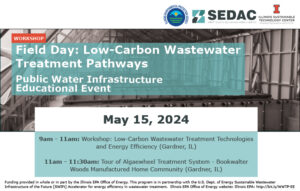Field Day: Low-Carbon Wastewater Treatment Pathways


SEDAC | Smart Energy Design Assistance Center at The University of Illinois, Urbana-Champaign
Energy Efficiency in Illinois , Energy Code Training, Energy Code Workshops, Online Energy Code Training, Wastewater energy efficiency, Climate Action Planning, Incentives for Energy Efficiency in Illinois, Energy Efficiency Upgrades, Solar feasibility study, C-Pace Assistance, Green Business Certification
